This has been an exciting past month in Generative AI and Search! We released exclusive findings on Perplexity. Our Generative Parser™ does more than just delineate the intersections between SGE and Perplexity; it also highlights key focus areas for digital marketers aiming to boost referral traffic and develop robust strategies for generative search engine optimization.
It wasn’t just Perplexity that kept Generative Parser™ busy in March. There has been a hive of activity for Google SGE as well. We're currently observing signs that it’s ready to emerge from the experimental confines of Google Labs, which is a thrilling development. This past month has provided insights into Google's strategic direction as they prepare for the highly anticipated widespread release of SGE. Throughout March, five notable developments further suggest Google's steady progress toward the public rollout of SGE.
1. A New Intent-Based Module Emerged
In March, BrightEdge Generative Parser™ unveiled a new SGE feature—a module that empowers users to craft an itinerary through a singular query. This functionality started to emerge towards the month's end, signifying another leap in search intelligence. Now, users can input highly specific travel instructions into SGE, and it delivers. For instance, if you're planning a three-day exploration of downtown Chicago and require a daily schedule of activities, SGE can now comprehend this request and generate an intuitive, logical itinerary that aligns with your location and interests. This advancement showcases SGE's increasing sophistication in providing tailored and contextually relevant search results.
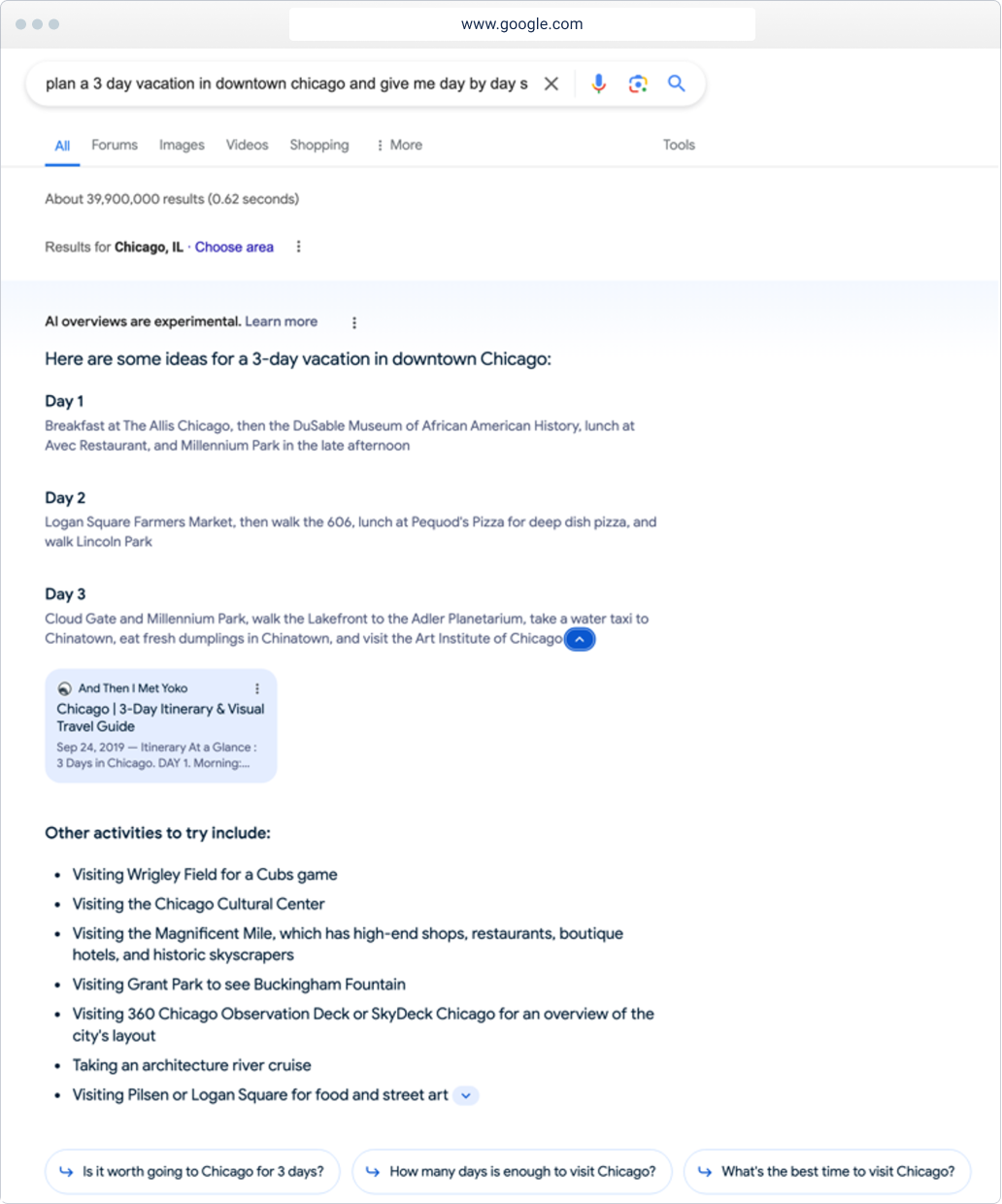
This strategic development in SGE is pivotal, particularly as intent-based results stand as a cornerstone of Perplexity. Integrating such nuanced, intent-driven functionalities into SGE not only enhances its competitive edge but also aligns with evolving user expectations for search technologies that comprehend and cater to specific needs with precision.
2. A More Concise Display for SGE Results
One nuanced but significant adjustment observed was the reduction of SGE’s on-screen real estate by an average of 12%. This streamlining is presumed to be Google's initiative to allocate more space to traditional organic search results. This act of rebalancing the innovative with the established could be a nod to user feedback or part of a larger scheme aimed at refining the overall search experience. It may also signal Google's preparation to integrate SGE more harmoniously with traditional search outputs in the public domain, ensuring that both paid and organic results retain their visibility without compromising the valuable screen area.
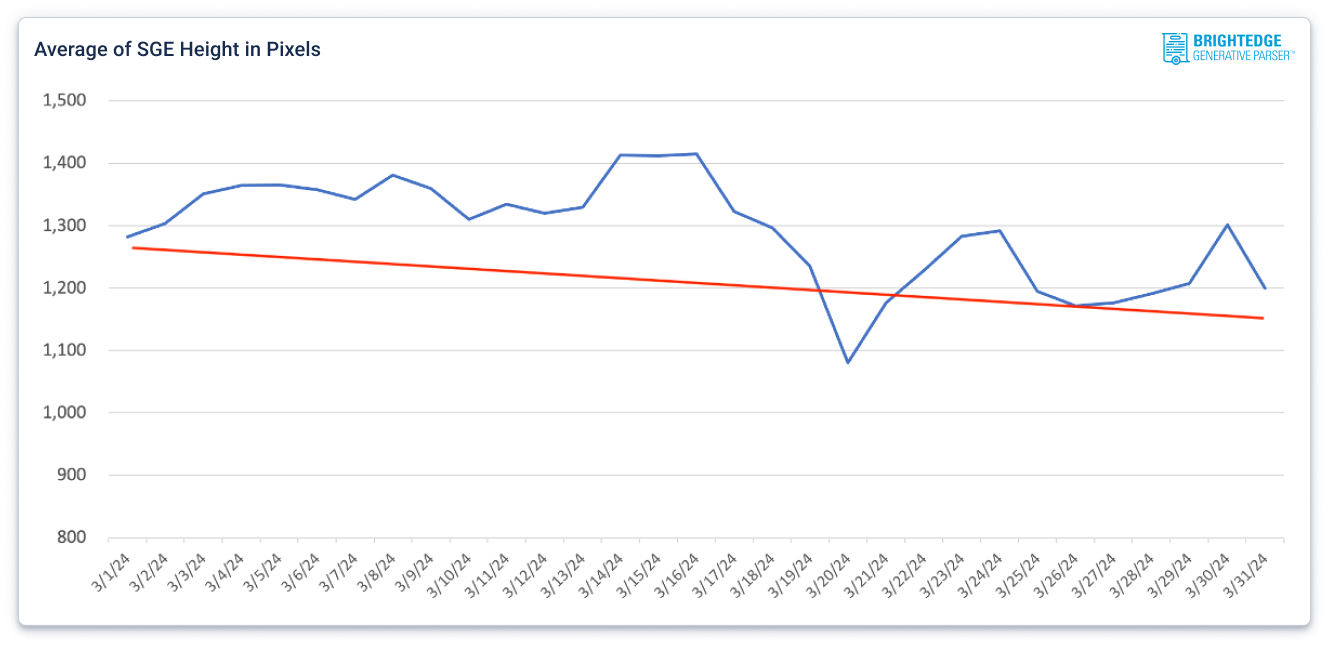
3. Personalization with Specific Features
Google's foray into personalization was observed with the resurgence of the 'Listen' button — a tool enabling users to engage with content audibly. Our BrightEdge Generative Parser Technology™ has ascertained that this feature is selectively displayed, and for the chosen users, it's quite prominent, appearing in up to 60% of their search results on March 14. Its targeted reintegration hints at Google's aim to craft a more individualized search journey, adapting SGE to the unique preferences and patterns of its users. This development suggests that an intricate understanding of audience characteristics, extending beyond mere search interactions, will become increasingly important for SGE optimization. Moreover, it underscores the potential necessity for content to be adaptable and optimized across diverse formats, positioning it favorably within the scope of SGE.
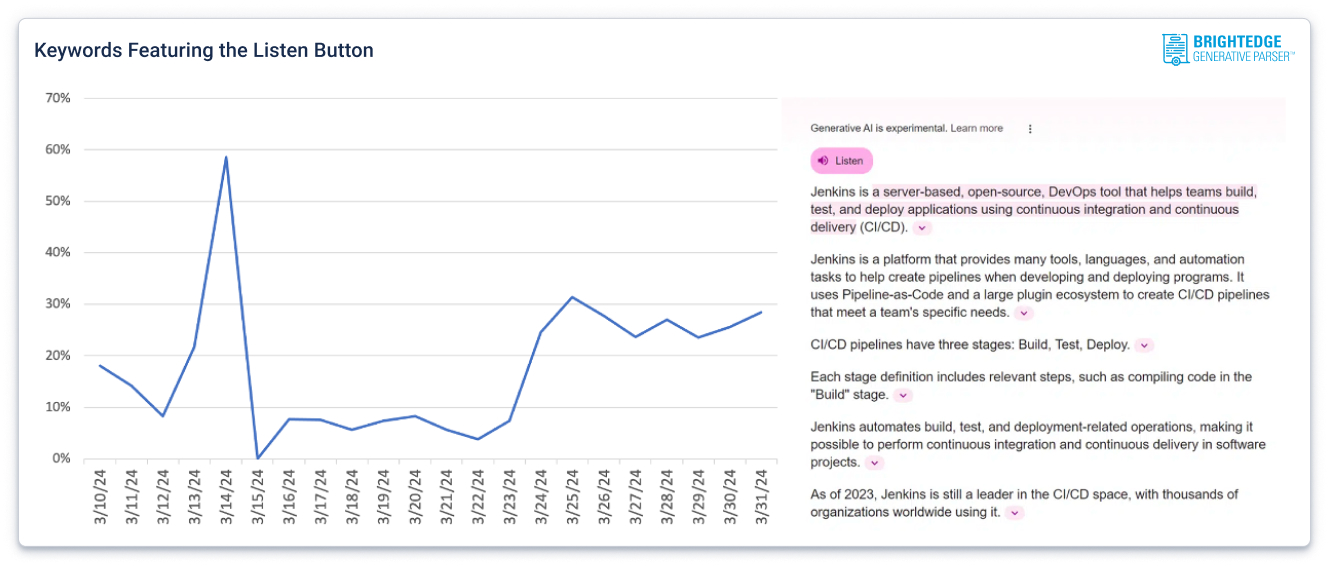
4. Testing with Reducing Product Viewer Visibility
Google’s exploration into optimizing the presentation of SGE continues, particularly evident in the ways products are displayed. The BrightEdge Generative Parser™ has recorded notable declines in views on March 15th and again on the 19th. These declines paralleled a shrinkage in the overall pixel size of the SGE displays and occurred amidst a broader contraction in the quantity of SGE results shown. While Google has not explicitly explained these adjustments, they imply that alongside downsizing SGE results, the temporary decrease in product viewer variations could be indicative of a strategy to accommodate ad placements within these SGE spaces.
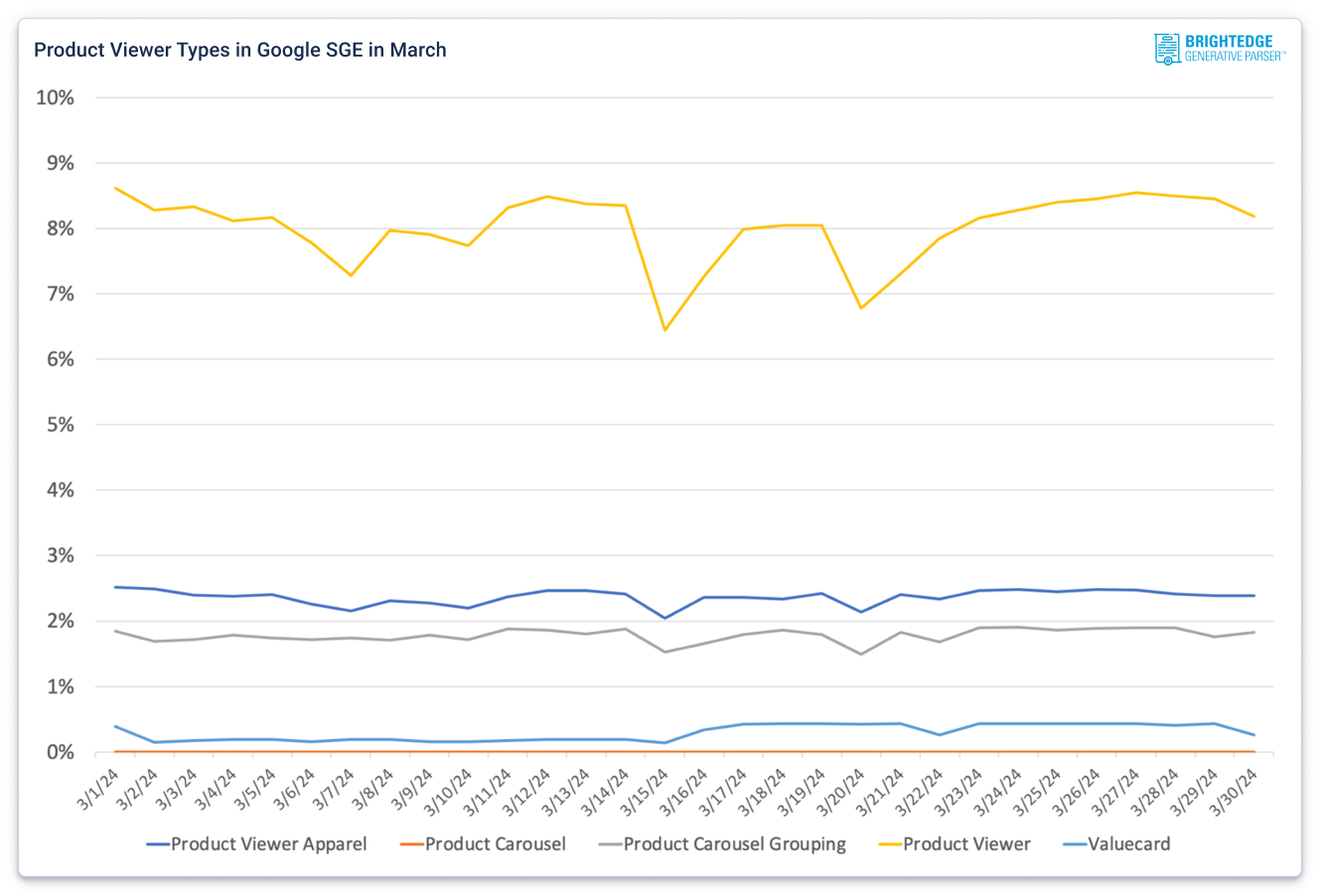
Historically, product viewers (shown in the yellow bar above) have been the predominant style for showcasing products within Search Generative Experiences (SGE). Our comprehensive Google SGE Guide offers an in-depth look at their manifestation and provides strategies for SEO professionals to harness referral traffic through them. These vibrant viewers serve as a rich source of product details, encompassing images, pricing, and review excerpts. Notably, due to their detailed text and visual content, they command a substantial portion of the screen real estate.

Google's trials involving the temporary removal of these product viewers from search results may signal an openness to experimentation with alternative formats, such as integrating paid results that share similar characteristics, like shopping carousels. This potential shift could indicate a strategic realignment within Google's SGE, possibly aiming to enhance revenue streams or streamline the user experience with a blend of organic and paid content.
5. A Brief Decrease in SGE Visibility
After the core update announcements in the first week of March, we at BrightEdge were among the first to detect a peculiar shift: nearly 40% of keywords unexpectedly stopped triggering Search Generative Experiences (SGE) results. This marked pause indicated a potential re-tuning of Google’s indexing strategies, possibly to integrate SGE more seamlessly with its primary search algorithms. Over the subsequent weeks, we observed the gradual reinstatement of SGE results, showcasing Google's rigorous process of trial and refinement. These updates, with a focus on combating spam and enhancing the quality of content surfaced in search results, hint at Google's commitment to ensuring that both SGE and conventional search results are equally reliable and valuable for users. This interruption in SGE result display may very well be an indicator of Google's efforts to synchronize SGE with the latest core update enhancements.
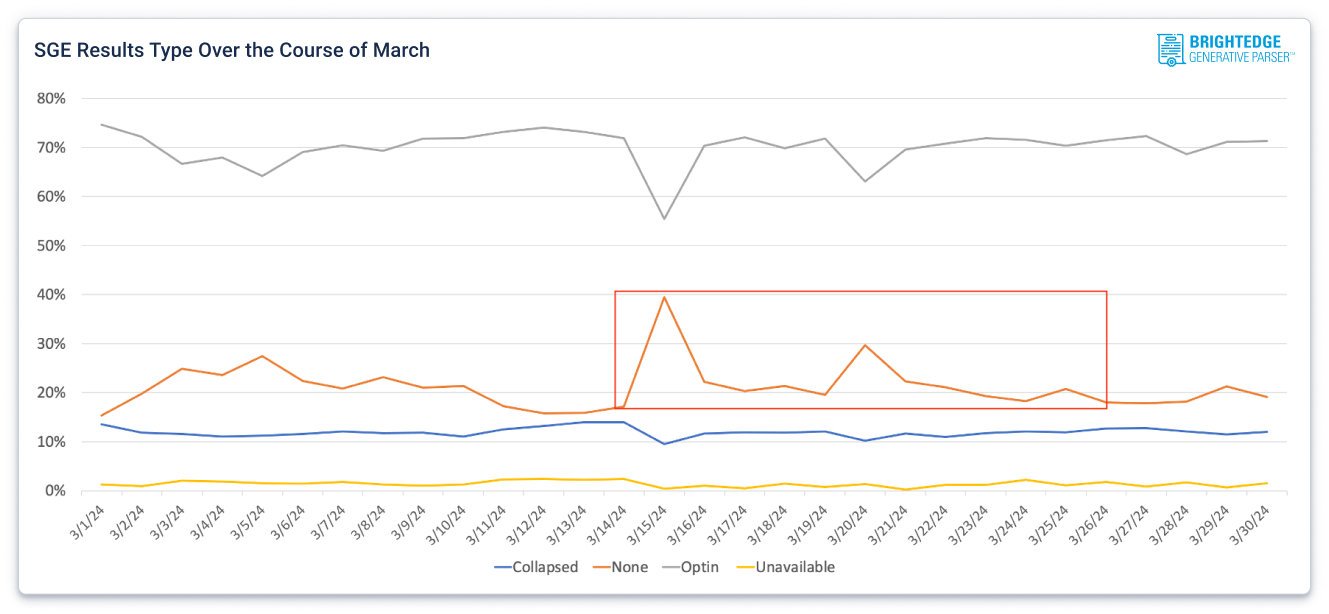
When will SGE Go to General Release?
In a significant leap toward a broader release, AI-generated results from SGE have started appearing for users outside the confines of Google Labs. This first began on March 22; however, these views were only shown to specific users before they disappeared. While there's widespread speculation about an official launch date, Google has yet to provide concrete details. Nevertheless, data from BrightEdge Generative Parser™ throughout March—highlighting a temporary reduction in AI-generated results, adjustments in product presentation, the introduction of new user-intent modules, and a streamlined search experience—suggests that Google is methodically preparing SGE for seamless integration with traditional search outcomes.
The future of search, particularly with the rise of Generative Engine Optimization, looks promising. We eagerly anticipate the innovations this will bring to the field. To keep abreast of these advancements, we recommend regularly consulting our Ultimate Guide to SGE and our newly introduced Guide to Perplexity, ensuring you have access to the latest insights and thorough analyses.

